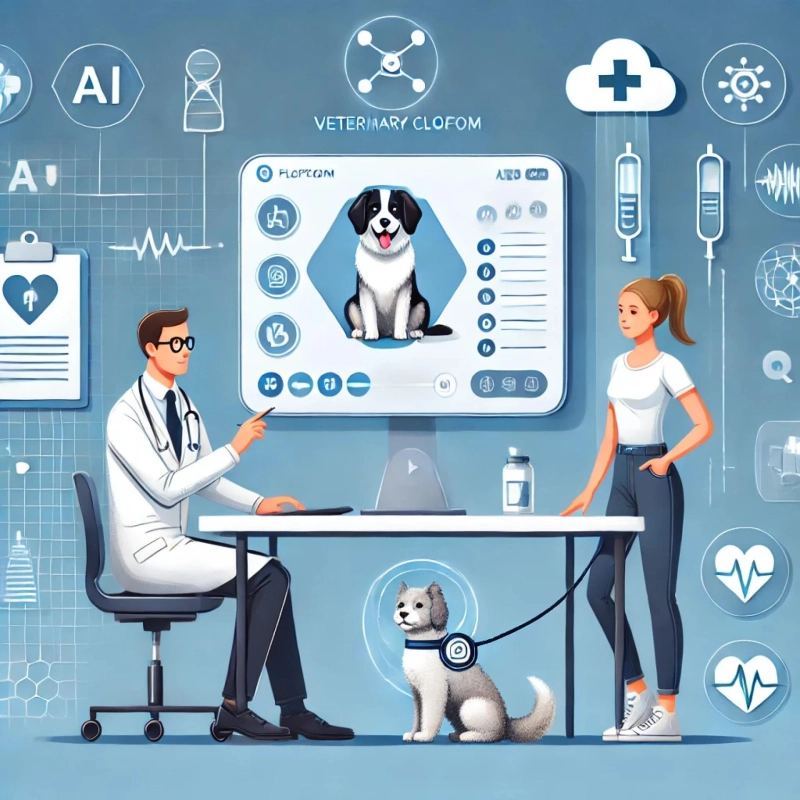Introduction
The animal health industry is undergoing a rapid transformation driven by digital innovations. Web-based platforms are becoming an essential tool in veterinary care, allowing veterinarians, pet owners, and livestock managers to access medical records, schedule appointments, and consult with professionals remotely. These platforms streamline operations, improve communication, and enhance healthcare services for pets, farm animals, and even wildlife.
As the demand for efficient, tech-driven healthcare solutions grows, veterinary clinics and pet care businesses must adapt to web-based systems that offer convenience, accessibility, and real-time data analysis. In this blog, we explore the key benefits, features, and impacts of web-based platforms in the animal health industry.
Importance of Web-Based Platforms in Veterinary Care
Enhancing Veterinary Practice Management
Traditional veterinary management involves handling piles of paperwork, scheduling appointments manually, and recording patient histories in physical files. A web-based platform digitizes these processes, making it easier for veterinarians to manage their practice. Cloud-based veterinary software enables clinics to store patient records securely, automate appointment bookings, and maintain an organized workflow. This digital shift results in increased efficiency and enhanced client satisfaction.
Telemedicine and Remote Health Monitoring
Telemedicine has become a game-changer in veterinary care. Web-based platforms enable pet owners to consult with veterinarians through virtual appointments, reducing unnecessary clinic visits and ensuring timely medical attention for pets and farm animals. Remote monitoring allows veterinarians to track health conditions using digital tools, ensuring proactive intervention in case of abnormalities. This technology is particularly beneficial for pet owners in remote locations where veterinary services are limited.
AI and Data-Driven Decision Making in Animal Health
Artificial intelligence (AI) integrated into web-based veterinary platforms enhances decision-making processes. AI-powered tools can analyze patient histories, predict potential health risks, and recommend personalized treatment plans. Machine learning algorithms help veterinarians detect early signs of diseases, improving diagnosis accuracy. Additionally, data analytics provide insights into treatment effectiveness, helping veterinarians refine their practices based on real-world outcomes.
Key Features of a Web-Based Animal Health Platform
Cloud-Based Medical Records and Data Storage
Storing patient records in the cloud ensures secure, easy access to critical medical information. Veterinarians can retrieve pet health records, vaccination details, prescriptions, and past treatment histories instantly. This minimizes the risk of losing essential medical data and enhances collaboration between multiple veterinary professionals managing the same patient.
Telehealth and Virtual Consultations for Pet Owners
A web-based platform enables seamless virtual consultations, providing pet owners with professional veterinary advice from the comfort of their homes. This feature is particularly useful for routine check-ups, post-surgical follow-ups, and behavioral consultations, eliminating the need for unnecessary in-person visits.
Automated Appointment Scheduling and Client Communication
Online booking systems simplify the appointment process by allowing pet owners to schedule visits through a user-friendly interface. Automated reminders reduce no-shows and cancellations, ensuring optimized clinic operations. In addition, integrated communication tools like SMS, email, and in-app messaging keep clients informed about their pet’s health status and upcoming appointments.
Integration with Wearable Pet Health Monitoring Devices
Modern veterinary platforms can integrate with wearable pet health devices that track activity levels, heart rate, and overall well-being. These smart devices collect real-time data, helping veterinarians monitor pets' health conditions remotely. Such integrations allow early detection of health issues, enabling preventive care and reducing emergency visits.
Benefits for Veterinary Clinics, Pet Owners, and Farmers
Streamlining Operations for Veterinary Clinics
Veterinary practices using web-based platforms experience improved efficiency in daily operations. Automated record-keeping, digital prescriptions, and online billing reduce administrative workloads, allowing veterinarians to focus more on patient care. Cloud-based solutions also facilitate multi-location management for clinics with multiple branches, ensuring seamless coordination.
Improved Access to Care for Pet Owners and Livestock Managers
Web-based platforms bridge the gap between pet owners, farmers, and veterinary professionals. Pet owners can receive guidance on pet nutrition, vaccinations, and emergency care through digital consultations. Livestock managers can track herd health, receive alerts for disease outbreaks, and consult agricultural veterinarians without needing physical visits. This accessibility improves overall animal welfare and reduces mortality rates in farm animals.
Role of Web-Based Platforms in Disease Prevention and Research
Data collected through web-based platforms plays a crucial role in veterinary research and disease prevention. Veterinary organizations can analyze trends in disease outbreaks, track vaccination rates, and develop targeted intervention strategies. Researchers can access anonymized data sets to study emerging animal health patterns, contributing to advancements in veterinary medicine.
Celeritas Digital and Custom Web-Based Solutions
Celeritas Digital is a leader in providing custom web-based solutions for the animal health industry. Their innovative platforms enable veterinary professionals to streamline their operations, improve client communication, and integrate advanced analytics for better patient care.
Conclusion
The adoption of web-based platforms in the animal health industry is revolutionizing veterinary care, making it more efficient, accessible, and data-driven. From telehealth consultations to AI-powered diagnosis, digital solutions are paving the way for improved pet and livestock health management. Veterinarians, pet owners, and livestock managers must embrace these innovations to stay ahead in the evolving landscape of animal healthcare.
For veterinary professionals looking to integrate a web-based platform, choosing a solution with robust security, seamless integrations, and user-friendly interfaces is key. As technology continues to advance, digital veterinary platforms will become an indispensable part of animal healthcare.
Frequently Asked Questions (FAQs)
What is a web-based platform in animal healthcare?
A web-based platform in animal healthcare is a digital tool that enables veterinarians, pet owners, and livestock managers to access medical records, schedule appointments, conduct virtual consultations, and monitor animal health remotely.
How does telemedicine benefit pet owners and veterinarians?
Telemedicine provides pet owners with convenient access to veterinary advice without requiring an in-person visit. It allows veterinarians to diagnose and treat minor health concerns, monitor chronic conditions, and provide post-surgical care remotely.
Are web-based veterinary platforms secure?
Yes, most web-based veterinary platforms use advanced encryption and data security measures to protect sensitive patient information. Compliance with veterinary data protection regulations ensures that medical records remain confidential and secure.
Can these platforms integrate with existing veterinary software?
Many modern web-based veterinary platforms offer seamless integrations with existing practice management systems, electronic medical records (EMRs), and third-party applications, allowing veterinarians to enhance their workflow without disrupting current operations.
How do digital solutions improve disease prevention in animals?
Web-based platforms collect and analyze health data, helping veterinarians detect early signs of diseases. They also assist in tracking vaccination schedules, monitoring disease outbreaks, and enabling preventive care strategies to improve animal health outcomes.


